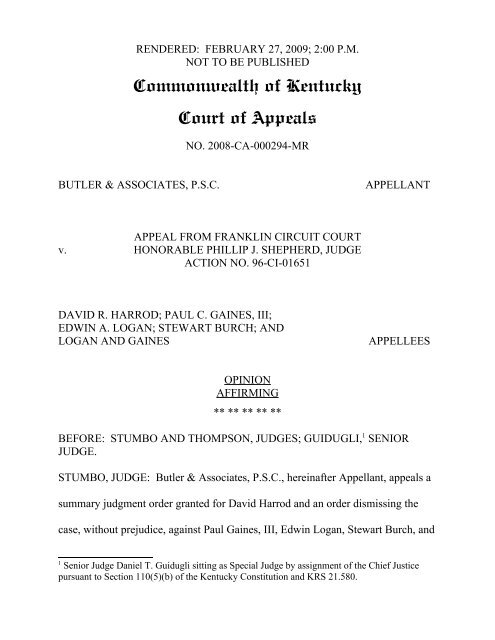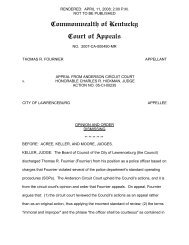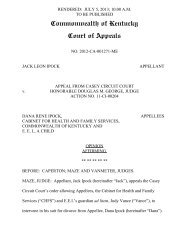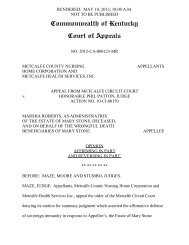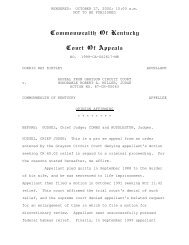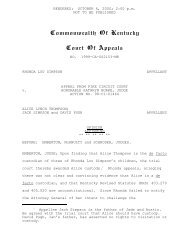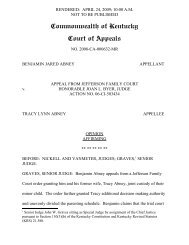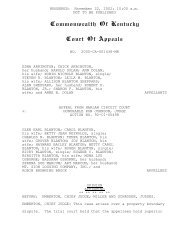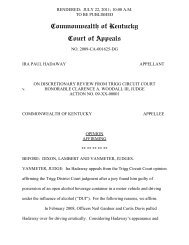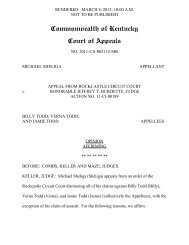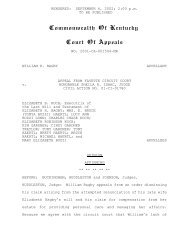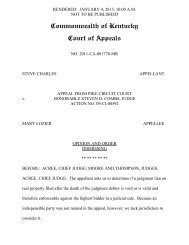Commonwealth of Kentucky Court of Appeals - Kentucky Supreme ...
Commonwealth of Kentucky Court of Appeals - Kentucky Supreme ...
Commonwealth of Kentucky Court of Appeals - Kentucky Supreme ...
Create successful ePaper yourself
Turn your PDF publications into a flip-book with our unique Google optimized e-Paper software.
RENDERED: FEBRUARY 27, 2009; 2:00 P.M.<br />
NOT TO BE PUBLISHED<br />
<strong>Commonwealth</strong> <strong>of</strong> <strong>Kentucky</strong><br />
<strong>Court</strong> <strong>of</strong> <strong>Appeals</strong><br />
NO. 2008-CA-000294-MR<br />
BUTLER & ASSOCIATES, P.S.C. APPELLANT<br />
APPEAL FROM FRANKLIN CIRCUIT COURT<br />
v. HONORABLE PHILLIP J. SHEPHERD, JUDGE<br />
ACTION NO. 96-CI-01651<br />
DAVID R. HARROD; PAUL C. GAINES, III;<br />
EDWIN A. LOGAN; STEWART BURCH; AND<br />
LOGAN AND GAINES APPELLEES<br />
OPINION<br />
AFFIRMING<br />
** ** ** ** **<br />
BEFORE: STUMBO AND THOMPSON, JUDGES; GUIDUGLI, 1 SENIOR<br />
JUDGE.<br />
STUMBO, JUDGE: Butler & Associates, P.S.C., hereinafter Appellant, appeals a<br />
summary judgment order granted for David Harrod and an order dismissing the<br />
case, without prejudice, against Paul Gaines, III, Edwin Logan, Stewart Burch, and<br />
1 Senior Judge Daniel T. Guidugli sitting as Special Judge by assignment <strong>of</strong> the Chief Justice<br />
pursuant to Section 110(5)(b) <strong>of</strong> the <strong>Kentucky</strong> Constitution and KRS 21.580.
the law firm <strong>of</strong> Logan and Gaines. Appellant claims that the trial court made<br />
evidentiary errors and that summary judgment should have been granted in its<br />
favor. Also, Appellant argues that Mr. Gains, Mr. Logan, Mr. Burch and the law<br />
firm should not have been dismissed from the case. We find that summary<br />
judgment was properly granted in favor <strong>of</strong> Appellee, Harrod, and that the order<br />
dismissing the other Appellees from the case was not timely appealed. As such,<br />
we affirm.<br />
Appellant is an accounting firm that was owned by Harold Butler at<br />
all times pertinent to the facts <strong>of</strong> this opinion. Mr. Harrod worked as an accountant<br />
for Appellant until November 15, 1995. Mr. Harrod worked for Appellant for<br />
approximately 11 years under various employment contracts, the last <strong>of</strong> which was<br />
entered into on October 1, 1990.<br />
In 1989, Mr. Butler sold ownership interests in Appellant to Mr.<br />
Harrod and two other employees. In conjunction with the purchase, Mr. Harrod<br />
and the other two employees signed an employment contract which included a<br />
client list protection provision requiring any accountant who left the firm to pay the<br />
firm a sum <strong>of</strong> money if that accountant performed work for any <strong>of</strong> the firm’s then<br />
existing clients. In other words, if the accountant left the firm and took some<br />
clients with him, the accountant would have to pay the firm money. This provision<br />
applied to any accounting work performed during a period <strong>of</strong> “three (3) years from<br />
the date their employment or ownership interest in the corporation terminates.”<br />
2
Less than one year later, Mr. Butler decided to repurchase the interests<br />
he had sold to Mr. Harrod and the other employees. Harrod and one <strong>of</strong> the other<br />
employees sold their interests back to Mr. Butler. As with the previous sale <strong>of</strong><br />
interests, Mr. Harrod signed a new employment contract on October 1, 1990. This<br />
contract also had a client list protection provision. It was worded differently<br />
requiring payment to the firm if the accountant took clients and did work for “three<br />
(3) years from the date <strong>of</strong> this contract.” (Emphasis added.)<br />
On November 15, 1996, more than five years after signing the 1990<br />
contract, Mr. Harrod ended his employment with Appellant. In a meeting prior to<br />
Mr. Harrod’s departure, Mr. Butler advised Mr. Harrod that he would need to pay<br />
Appellant for any clients he took with him and requested that he sign a promissory<br />
note to do so. Mr. Harrod stated that no such payment was required because the<br />
client list protection provision had only been effective for three years from the date<br />
<strong>of</strong> the contract and had expired more than two years earlier. This suit followed.<br />
Appellant filed a complaint seeking reformation <strong>of</strong> the 1990 contract<br />
as it pertained to the client list protection provision. Appellant argued that the<br />
provision should have been similar to the 1989 provision, which required payment<br />
if the employee left, took clients, and did work for those clients during a period <strong>of</strong><br />
“three (3) years from the date their employment or ownership interest in the<br />
corporation terminates.” Appellant also asserted a legal malpractice claim against<br />
3
the law firm Logan and Gaines alleging it and its lawyers, Gaines, Logan, and<br />
Burch, were negligent in preparing the contract provision.<br />
Logan and Gaines filed a motion to dismiss alleging that Appellant’s<br />
damages were speculative and the case should be dismissed as to the law firm and<br />
lawyers until the underlying contractual claim against Mr. Harrod had been<br />
determined. The trial court agreed and held that until it is determined whether or<br />
not the contract provision was mutually agreed upon, the legal malpractice cause <strong>of</strong><br />
action has not accrued. On April 24, 1997, the law firm and lawyers were<br />
dismissed from the case via an interlocutory order. The case then proceeded<br />
against Mr. Harrod only.<br />
On November 17, 2003, the case was heard by the trial court without<br />
a jury upon the trial judge’s determination that this was an equitable action. On<br />
December 31, 2003, the trial court found in favor <strong>of</strong> Appellant, finding that a<br />
mutual mistake existed.<br />
Mr. Harrod appealed the trial court’s ruling. Appellant took no action<br />
against Logan and Gaines or its attorneys. A previous panel <strong>of</strong> this <strong>Court</strong> found<br />
that the trial court committed reversible error by using affidavits as substantive<br />
evidence. In its opinion, the trial court used information gathered from affidavits<br />
filed in the record as evidence to find in favor <strong>of</strong> Appellant, specifically, the<br />
affidavit <strong>of</strong> Harold Butler. 2 Civil Rule (CR) 43.04 states that in any action tried<br />
2 Harold Butler died while this litigation was pending and his deposition was never taken.<br />
4
efore the court, testimony <strong>of</strong> witnesses must be presented under oath and orally in<br />
open court or by deposition. No provision is made for the consideration <strong>of</strong><br />
affidavits as evidence. The case was remanded to the trial court for a new trial<br />
without consideration <strong>of</strong> the affidavits as substantive evidence.<br />
Upon remand, Mr. Harrod filed a renewed motion for summary<br />
judgment which was granted. The trial court found that there was no ambiguity in<br />
the contract provision and therefore no extrinsic evidence could be introduced at<br />
trial to refute the provision. It also held that there was no evidence to support a<br />
finding <strong>of</strong> mutual mistake allowing for the reformation <strong>of</strong> the contract. The trial<br />
court also declined to consider the affidavit <strong>of</strong> Harold Butler in making its<br />
decision. This appeal followed.<br />
Appellant’s first argument is that the trial court erred in not<br />
considering Harold Butler’s affidavit in making its decision regarding summary<br />
judgment. Appellant argues that CR 56 allows the court to rely on affidavits when<br />
deciding if summary judgment is proper. This argument is only partially correct.<br />
CR 56.03 states that affidavits may be used to determine if summary judgment is<br />
proper, but CR 56.05 says that these affidavits “shall set forth such facts as would<br />
be admissible in evidence . . . .” As the previous panel <strong>of</strong> this <strong>Court</strong> held,<br />
affidavits themselves are not admissible at trial. Since Mr. Butler died prior to trial<br />
and no deposition was taken, any evidence contained in his affidavit would not be<br />
5
admissible at trial. Accordingly, the lower court correctly refused to consider the<br />
affidavit when ruling on the motion for summary judgment.<br />
Appellant next argues that the trial court erred in concluding that two<br />
letters between the legal counsels for the parties were inadmissible on the issue <strong>of</strong><br />
reformation because the contract provision is unambiguous and these letters are<br />
extrinsic evidence. “In the absence <strong>of</strong> ambiguity a written instrument will be<br />
strictly enforced according to its terms.” Mounts v. Roberts, 388 S.W.2d 117,<br />
119 (Ky. 1965). Additionally, “a court will interpret the contract’s terms by<br />
assigning language its ordinary meaning and without resort to extrinsic evidence.”<br />
Frear v. P.T.A. Industries, Inc., 103 S.W.3d 99, 106 (Ky. 2003). “An ambiguous<br />
contract is one capable <strong>of</strong> more than one different, reasonable interpretation.”<br />
Central Bank & Trust Co. v. Kincaid, 617 S.W.2d 32, 33 (Ky. 1981).<br />
Essentially, extrinsic evidence will not be considered absent an ambiguity in the<br />
contract.<br />
The provision <strong>of</strong> the contract in question states in relevant part:<br />
In the event Harrod leaves the employment <strong>of</strong> the<br />
Corporation during the term <strong>of</strong> this contract . . . the<br />
parties agree that the following conditions and covenants<br />
shall automatically become applicable: Should Harrod<br />
perform any accounting services, in any manner,<br />
including those services normally <strong>of</strong>fered by Certified<br />
Public Accountants, for any clients <strong>of</strong> the Corporation . .<br />
. during the period <strong>of</strong> three (3) years from the date <strong>of</strong> this<br />
contract, Harrod shall pay to the Corporation . . . .<br />
6
We agree with the trial court’s finding that this contract provision is unambiguous.<br />
It straightforwardly states that if Mr. Harrod leaves Appellant’s employment within<br />
three years <strong>of</strong> signing the contract, then he must compensate Appellant. Since Mr.<br />
Harrod left Appellant’s employment five years after signing the contract, no<br />
payments were necessary. Because the term is unambiguous, the lower court<br />
appropriately declined to consider extrinsic evidence, which included the two<br />
letters in question.<br />
Similarly, Appellant also contends that the trial court erred in not<br />
considering past employment contracts. The trial court did not consider these<br />
because they were extrinsic to the contract at issue and, as the contract was<br />
unambiguous, inadmissible. We affirm this issue for the same reasons as above.<br />
The crux <strong>of</strong> Appellant’s appeal is that the trial court erred in granting<br />
Mr. Harrod’s summary judgment and in finding there was no mutual mistake so as<br />
to grant reformation <strong>of</strong> the contract.<br />
The standard <strong>of</strong> review on appeal <strong>of</strong> a summary judgment<br />
is whether the trial court correctly found that there were<br />
no genuine issues as to any material fact and that the<br />
moving party was entitled to judgment as a matter <strong>of</strong> law.<br />
<strong>Kentucky</strong> Rules <strong>of</strong> Civil Procedure (CR) 56.03 . . . .<br />
“The record must be viewed in a light most favorable to<br />
the party opposing the motion for summary judgment and<br />
all doubts are to be resolved in his favor.” Steelvest, Inc.<br />
v. Scansteel Service Center, Inc., Ky., 807 S.W.2d 476,<br />
480 (1991). Summary “judgment is only proper where<br />
the movant shows that the adverse party could not prevail<br />
under any circumstances.” Steelvest, 807 S.W.2d at 480,<br />
citing Paintsville Hospital Co. v. Rose, Ky., 683 S.W.2d<br />
7
255 (1985). Consequently, summary judgment must be<br />
granted “[o]nly when it appears impossible for the<br />
nonmoving party to produce evidence at trial warranting<br />
a judgment in his favor . . .” Huddleston v. Hughes, Ky.<br />
App., 843 S.W.2d 901, 903 (1992).<br />
Scifres v. Kraft, 916 S.W.2d 779, 781 (Ky. App. 1996).<br />
“As a general proposition a court <strong>of</strong> equity will not reform a written<br />
instrument unless it appears there was a valid agreement; that the written<br />
instrument failed to express the agreement; and that the failure was due to mutual<br />
mistake. These circumstances must be shown by clear and convincing pro<strong>of</strong>.”<br />
Berry v. Crisp, 247 S.W.2d 384, 385 (Ky. 1952). “[A] unilateral mistake is not a<br />
ground for reformation.” Id. “A mutual mistake in respect to reformation is one in<br />
which both parties participate, each laboring under the same misconception.”<br />
Karrick v. Wells, 307 S.W.2d 929, 931 (Ky. 1957).<br />
Here, the trial court was correct in granting summary judgment. Mr.<br />
Gaines, the attorney who drafted the contract, testified in his deposition that Mr.<br />
Butler always read contracts before signing them and Appellant admitted that Mr.<br />
Butler specifically read this contract. Mr. Gaines also testified that Mr. Butler was<br />
meticulous with his contracts and any provision contained in the contract was one<br />
that Mr. Butler intended.<br />
In regard to the change in the terms <strong>of</strong> the 1990 contract as compared<br />
to the 1989 contract provisions, Mr. Gaines testified that<br />
8
[a]s far as I’m concerned, these contracts express exactly,<br />
both <strong>of</strong> them, the desires Mr. Butler wanted at the time I<br />
prepared the contracts. The two contracts are different,<br />
for example, in the payout provision and one is a five<br />
year deal, one is not. One says it kicked in three years<br />
from the date <strong>of</strong> the contract, one says three years from<br />
the date their employment or ownership interest in the<br />
corporation terminates. I believe it’s exactly what he<br />
wanted and that’s what I drafted.<br />
Additionally, Mr. Harrod has vehemently denied that the contract<br />
means anything but what it purports to and that there was no mistake. Mr. Harrod<br />
explained during his deposition that he believed the less restrictive provision was<br />
an inducement for him and the other two employees to sell their stock back to Mr.<br />
Butler at a loss. Also, Appellant’s response to Requests for Admissions conceded<br />
that Mr. Butler read the employment contract before signing it. Finally, since the<br />
contract term is unambiguous, no extrinsic evidence is admissible.<br />
There is no evidence in the record indicating a mutual mistake that<br />
would permit reformation <strong>of</strong> this contract. With the unfortunate death <strong>of</strong> Mr.<br />
Butler and testimony <strong>of</strong> Mr. Gaines and Mr. Harrod that the contract provision is<br />
correct as is, there is no clear and convincing evidence <strong>of</strong> mutual mistake and<br />
therefore no possibility that Appellant could prevail at trial. Accordingly we<br />
affirm the summary judgment.<br />
Appellant additionally makes a brief argument concerning the<br />
dismissal <strong>of</strong> the Logan and Gaines law firm and its lawyers from the case back in<br />
1997. They were dismissed without prejudice via an interlocutory order because<br />
9
the trial judge found that until Appellant prevailed against Mr. Harrod, damages<br />
for legal malpractice were too speculative. Appellant now claims the 1997 trial<br />
judge erred in dismissing these parties.<br />
The trial court dismissed the claim on the grounds that because there<br />
were no legally recognizable damages unless Appellant prevailed on the<br />
underlying lawsuit, the malpractice claim was not ripe and the statute <strong>of</strong> limitations<br />
did not begin to run. We agree with the trial court’s analysis.<br />
As in Alagia, Day, Trautwein and Smith v. Broadbent, 882 S.W.2d<br />
121 (Ky. 1994), the legal harm to Appellant could not be determined until the<br />
contract claim was resolved. Thus, any damages remained speculative.<br />
Mr. Harrod.<br />
For the above reasons we affirm the summary judgment in favor <strong>of</strong><br />
ALL CONCUR.<br />
BRIEFS AND ORAL ARGUMENT<br />
FOR APPELLANT:<br />
Ronald G. Polly<br />
Whitesburg, <strong>Kentucky</strong><br />
BRIEF AND ORAL ARGUMENT<br />
FOR APPELLEE,<br />
DAVID R. HARROD:<br />
J. Guthrie True<br />
Frankfort, <strong>Kentucky</strong><br />
BRIEF AND ORAL ARGUMENT<br />
FOR APPELLEES,<br />
PAUL C. GAINES, III; EDWIN A.<br />
LOGAN; STEWART BURCH; AND<br />
LOGAN & GAINES:<br />
Douglas L. Hoots<br />
Lexington, <strong>Kentucky</strong><br />
10


